The Workshop on Computational Intelligence and Games was successfully held on 13 April, 2024! 🎉🎉
On this Page:
- agenda 丨
- Morning Sessions: Speakers and Topics 丨
- Afternoon Sessions: Speakers and Topics 丨
- Picture Gallery
Organised and funded by:
- Learning and Optimisation in Games (LOG), a research team from the Department of Computer Science and Engineering (CSE) and the Research Institute of Trustworthy Autonomous System (RITAS), Southern University of Science and Technology (SUSTech), Shenzhen, China
Supported by:
- Department of Computer Science and Engineering (CSE), SUSTech
- Research Institute of Trustworthy Autonomous System (RITAS), SUSTech
- IEEE Computational Intelligent Society (CIS), particularly IEEE CIS Games Technical Committee, IEEE CIS Young Professionals Sub-Committee, and IEEE CIS Shenzhen Chapter
- IEEE Young Professionals Affinity Group of Guangzhou Section
Organisers:
- Chair: Jialin Liu, LOG, CSE, SUSTech, China
- Secretary: Xiao Zhang, LOG, CSE, SUSTech, China
- Publicity Chair: Yueyun Zhong, LOG, CSE, SUSTech
Registration:
Everyone is welcome to join! This workshop is FREE to
attend. NO registration is required.Participants are kindly requested to arrange their accommodations and meals by themselves.
Sponsorship is welcomed (contact: zhangxiao(at)mail.sustech.edu.cn).
Location:
Lecture Hall 813, South Tower of the College of Engineering (CoE) Building, SUSTech
Date:
13 April, 2024
Schedule:
| Time | Event | Speaker |
|---|---|---|
| 8:45-9:00 | Welcome | Jialin Liu (SUSTech, China) |
| 9:00-9:45 | Keynote 1: Human Feedback via Games | Georgios N. Yannakakis (University of Malta, Malta) |
| 9:45-10:30 | Keynote 2: What Comes After Human-Centered AI? Design Insights from Games, Well-being Apps, and Art | Jichen Zhu (IT University of Copenhagen, Denmark) |
| 10:30-11:00 | Students' Posters | Photo & Coffee |
| 11:00-11:45 | Keynote 3: The Promise of Multi-objective Sequence Learning | Mike Preuss (Universiteit Leiden, Netherlands) |
| 11:45-12:30 | Keynote 4: Pioneering 2D Image Generation for AAA Games | Alexis Rolland (Ubisoft La Forge) |
| 12:30-14:00 | Lunch on your own | |
| 14:00-14:45 | Keynote 5: AI for Tabletop Games | Diego Perez-Liebana (Queen Mary University of London, UK) |
| 14:45-15:30 | Keynote 6: What’s Next for Adversarial Search Techniques? | Mark Winands (Maastricht University, Netherlands) |
| 15:30-16:00 | Students' Posters | Photo & Coffee |
| 16:00-16:45 | Keynote 7: Empowering Game Designers with Automatic Playtesting | Raluca Gaina (Queen Mary University of London, UK) |
| 16:45-17:30 | Keynote 8: Text2Game: Text-conditioned Generation of Game Levels and Other Game Things | Julian Togelius (New York University, USA) |
| 17:30-18:30 | Panel: LLMs and Games | All speakers |
Keynotes (chronological order)
Morning Sessions
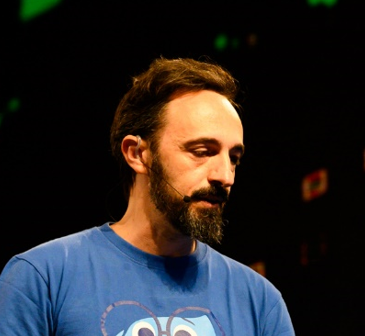
Prof. Georgios N. Yannakakis
University of Malta, MaltaTitle: Human Feedback via Games
Abstract: Why bother about human feedback and its computation? Why is subjective human feedback such a critical element of every aspect of AI and Games research nowadays? How can it help us test games, represent the games we play, design creative AI algorithms, offer reliable agency to AI, and ultimately understand player experience? In this talk, I will attempt to address these questions through a series of milestone research studies that led to a number of key lessons learned over the years. I will conclude the talk by suggesting directions through which human feedback can reframe the ways we build AI algorithms and develop games.
Bio: Georgios N. Yannakakis is a Professor at the Institute of Digital Games, University of Malta (UM), and a co-founder and research director of modl.ai (Malta). He is a leading expert of the game artificial intelligence research field with core contributions in machine learning, evolutionary computation, affective computing and player modelling, computational creativity and procedural content generation. He has published over 350 journal and conference papers in the aforementioned fields and his work has received several awards from top-tier academic conferences and journals. His research has been supported by numerous European grants and has appeared in Science Magazine and the New Scientist among other venues. Georgios has been involved in a number of journal editorial boards and he is currently the Editor in Chief of the IEEE Transactions on Games and an Associate Editor of the IEEE Transactions on Evolutionary Computation. He is the co-author of the Artificial Intelligence and Games textbook and the co-organiser of the Artificial Intelligence and Games summer school series. Georgios is an IEEE Fellow.
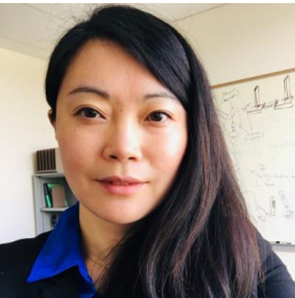
Prof. Jichen Zhu
IT University of Copenhagen, DenmarkTitle: What Comes After Human-Centered AI? Design Insights from Games, Well-being Apps, and Art
Abstract: Human-centered AI is an emergent research trend. It offers a promising direction to develop AI systems that benefit society by emphasizing user interactions, ethics, trust, and other important human factors. However, there are signs that human-centered AI relies on over-simplified notions of humans and interaction. In this talk, I will present some of our recent work on designing AI-based experiences in the contexts of computer games, well-being apps, and art. Based on these insights, I will reflect on current blind spots in human-centered AI and propose research directions toward designing next-generation human-AI interaction.
Bio: Dr. Jichen Zhu is an Associate Professor of Digital Design at the IT University of Copenhagen, Denmark. She directs the Procedural eXpression Lab (PXL) group and leads the User eXperience (UX) Design Specialization, focusing on the UX of AI/ML. Her research interest lies at the intersection of human-computer interaction, interaction/game design, and artificial intelligence (AI). Her focus is designing and developing novel human-AI interactions, especially in personalized games for learning and health. She has co-authored over 100 peer-reviewed research publications and received several Best Paper Awards. Her research has been funded by the National Science Foundation (U.S.), the National Institute of Health (U.S.), and Novo Nordic Foundation (Denmark). She is a Co-Editor of the Software Studies Book Series at MIT Press and a Board Member of the Society for the Advancement of the Science of Digital Games (SASDG). Jichen received a Ph.D. in Digital Media from Georgia Tech. She also holds an MS in Computer Science from Georgia Tech, a Master of Entertainment Technology from Carnegie Mellon University, and a BS from McGill University.

Prof. Mike Preuss
Universiteit Leiden, NetherlandsTitle: The Promise of Multi-objective Sequence Learning
Abstract: With Monte Carlo Tree Search being established in Game AI and beyond as standard tree search method for big game trees, the question of how to use it in a multi-objective context, that is, with more than one objective, is imminent. However, up to now, there have been only few algorithmic attempts, with rather mixed success. What are we overlooking here? The potential seems obvious. I am attempting to shade a bit of light on the matter and envision alternative approaches and uses in Game AI and Chemistry.
Bio: Mike Preuss is Associate Professor at LIACS, the computer science institute of Universiteit Leiden in the Netherlands. Previously, he was with ERCIS (the information systems institute of WWU Muenster, Germany), and before with the Chair of Algorithm Engineering at TU Dortmund, Germany, where he received his PhD in 2013 for his work in evolutionary algorithms for multimodal optimization. His current research focuses on Game AI algorithms and their application to real world problems, especially reinforcement learning, procedural content generation, social media computing, and hard application problems in Chemistry, as retrosynthesis.
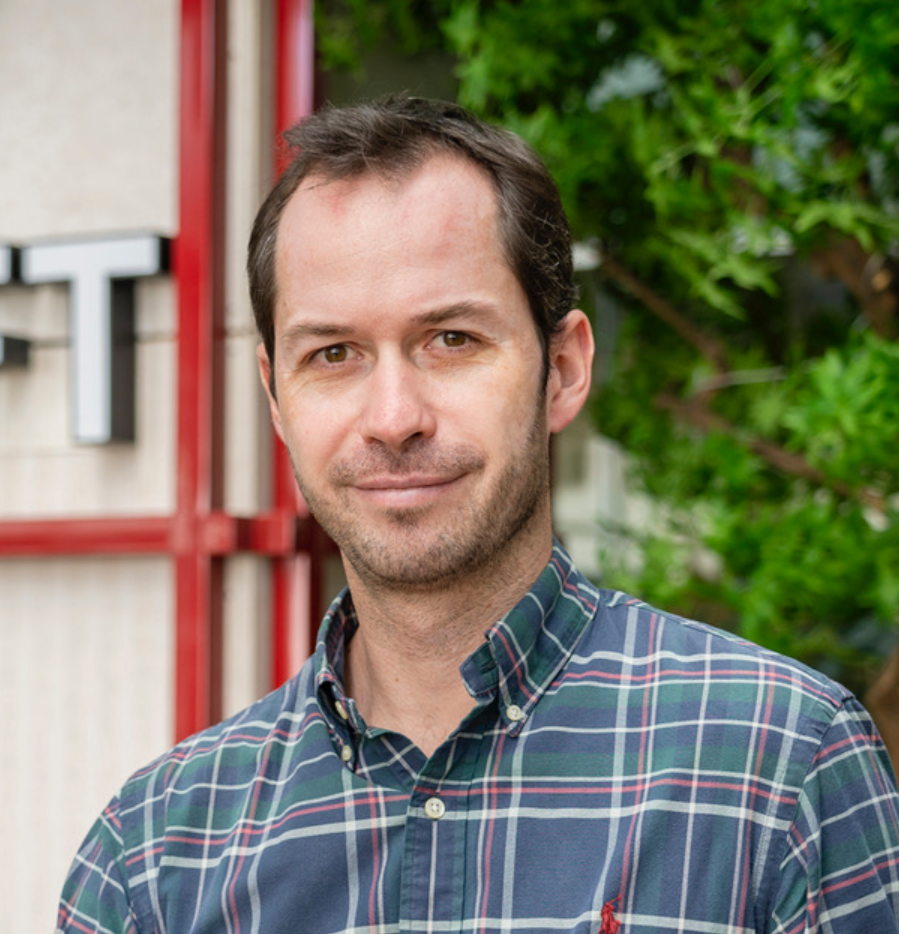
Dir. Alexis Rolland
Ubisoft La Forge, ChinaTitle: Pioneering 2D Image Generation for AAA Games
Abstract: In this presentation, we will delve into the transformative impact of image generation in the realm of video games, with a focus on how a AAA game development company such as Ubisoft approaches this technology. We will begin with a brief introduction about the evolution of image generation models. The talk will progress by examining the impact of this technology in game development workflows and in the game industry. And the remaining part will go into the details of Ubisoft’s approach and strategy to leverage this technology in a responsible fashion, with a focus on fine-tuning initiatives, methodologies, learnings and results.
Bio: Alexis Rolland has been working at Ubisoft for over 12 years. During this time, he occupied multiple roles in the fields of data, analytics, and machine learning. His early contributions to Ubisoft’s big data platform laid the groundwork for innovative technological advancements, which led him in 2018 to pioneer Ubisoft China AI & Data Lab, a technology team in charge of steering Ubisoft China studios towards the integration of Machine Learning into game development. Advancing to his current role in 2022, Alexis now spearheads La Forge, leading Ubisoft’s global R&D initiatives in China. He is passionate about artificial intelligence, a self-taught developer, and fascinated by how the alchemy of art and technology can bring immersive and interactive experiences in the realm of video games.
Afternoon Sessions
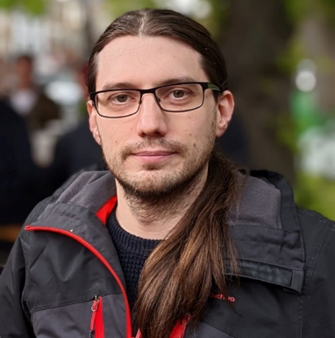
Prof. Diego Perez-Liebana
Queen Mary University of London, UKTitle: AI for Tabletop Games
Abstract: Tabletop Games (TTG) are multi-player games played on a table or flat surface, such as board, card, dice, miniature or tile-based games. They differ from traditional board games (such as Chess or Go) through a richer set of components, dynamics, rules and themes. In these games, players have to manage resources, deal with hidden information and stochasticity of random events. Games can be competitive, cooperative or usually a mixture of these, with coalitions of players forming and changing over the course of a game. Hence, players also need to negotiate or trade with each other, adding a social dimension that transcends the explicit game rules. Prominent examples across the genre are Settlers of Catan, Ticket to Ride, Terraforming Mars, and Diplomacy. In this talk, I'll show the latest research from the Game AI group at Queen Mary University of London on TTGs, in relation to game playing and design. This talk will include our latest work on variants of Monte Carlo Tree Search, heuristics, visualization of game spaces and AI-assisted game design. Finally, we'll discuss the possibilities for further research in this area and the Tabletop Games framework (TAG) as a catalyzer for this work.
Bio: I am a Senior Lecturer in Computer Games and Artificial Intelligence at Queen Mary University of London (UK). I hold a Ph.D in Computer Science from the University of Essex (2015). My research is centred in the application of Artificial Intelligence to games, Tree Search and Evolutionary Computation. I am especially interested on the application of Statistical Forward Planning methods (such as Monte Carlo Tree Search and Rolling Horizon Evolutionary Algorithms) to modern games, in particular to modern Tabletop Board Games. I am author of more than 100 papers in the field of Game AI, and co-founder of Tabletop R&D, a Queen Mary spin-out aimed at providing automatic tabletop games testing to board game designers and publishers.
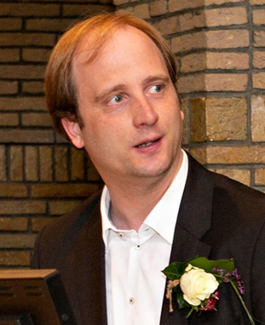
Prof. Mark Winands
Maastricht University, NetherlandsTitle: What’s Next for Adversarial Search Techniques?
Abstract: Abstract: Adversarial search techniques such as alpha-beta search or Monte-Carlo Tree Search have been key to the success of AI surpassing human players in many (abstract) games such as Backgammon, Checkers, Chess, or Go. The question emerges what would be new research lines for adversarial search techniques. In this talk, I will first give a brief introduction to adversarial search techniques, and discuss how they can be applied to real-world applications. I will mention new developments such as explainable search, self-adaptive (or generative) search engines and integrating search with new computing paradigms.
Bio: Mark Winands is the chair of the Department of Advanced Computing Sciences at Maastricht University. He obtained his Ph.D. degree in Artificial Intelligence from the Department of Computer Science, Maastricht University in 2004. Subsequently, he worked as a software engineer at Statistics Netherlands, and afterwards as a postdoctoral researcher at Reykjavik University. In 2006, he returned as a postdoctoral researcher at Maastricht University, and continued first as an assistant professor (2009), and subsequently as an as associate professor (2017). Since 2019, he has been appointed as a professor in machine reasoning, especially focussing on heuristic, adversarial, explainable and adaptive search. He is widely known of investigating underlying principles of Monte-Carlo Tree Search for which he received two NWO grants. Regarding other intelligent search techniques, he has made contributions in the minimax framework, hierarchical task networks and proof-number search.
He has published his work in international journals such as Artificial Intelligence Journal, Journal of AI Research, Knowledge Based Systems, Information Sciences, and Theoretical Computer Science. He serves as the editor-in-chief of the ICGA Journal, editor of Theoretical Computer Science, and as an associate editor of IEEE Transactions on Games. He has edited eight LNCS/CCIS conference proceedings on Game AI, and co-organized scientific events such as the Benelux Conference on Artificial Intelligence 2012, the 15th International Conference on Advances in Computer Games, the 2018 IEEE Conference on Computational Intelligence and Games, and several IJCAI / ECAI Game AI Workshops. Finally, he is a member of the Games Technical Committee (GTC) | IEEE Computational Intelligence Society, and vice-president of the International Computer Games Association.

Dr. Raluca D. Gaina
Queen Mary University of London, UKTitle: Empowering Game Designers with Automatic Playtesting
Abstract: The complexity of modern tabletop games has been steadily increasing since the mid-1990s. This results in an increase in time spent by designers developing (2-3 years on average from idea to commercialisation) and playtesting (6-24 months) a game, raising the barrier of entry to market for independent designers or small companies which do not have enough resources at their disposal. The effect is also felt by players, who find it harder to play such games due to the steep learning curve. This talk will explore how Tabletop R&D, a spin-out company from Queen Mary University of London, aims to address these issues and democratize the tabletop games market by providing game designers with automatic playtesting tools. Using the latest in Game AI technology and digital twins of tabletop games, we speed up development times, reduce costs and increase efficiency of an otherwise traditionally lengthy analogue process.
Bio: Dr. Raluca D. Gaina is currently a Lecturer in Game AI at Queen Mary University of London, where she obtained her Ph.D. in Intelligent Games and Games Intelligence. She has led innovative research in Simulation-Based decision-making and modern Tabletop Games, laying the foundation for the Tabletop Games Framework (TAG). She has co-organised top Game AI conferences, meetups, tutorials and competitions. She has over 30 publications in leading Game AI conferences (AAAI, COG) and journals (TOG), and received multiple awards for her public engagement videos. Her research interests include general video game playing AI, evolutionary algorithms and tabletop games. In 2023 she co-founded the first company offering automatic playtesting services to board game designers, Tabletop R&D.

Prof. Julian Togelius
New York University, USTitle: Text2Game: Text-conditioned Generation of Game Levels and Other Game Things
Abstract: The rise of LLMs has led to a great increase in our ability to use text prompts to control generators of various kinds. We have seen advances in generation of images, 3D objects, video, and text itself. But how will this work for game content? Game content such as levels have functionality constraints that might make them harder to generate; there is also less data available to train on, and even less of it is text-captioned. I will discuss a number of strategies for training text-conditioned game content generators, including fine-tuning, bootstrapping, and generator distillation. I will also show examples, ranging from tile-based 2D levels to Minecraft objects to game rules.
Bio: Julian Togelius is an Associate Professor in the Department of Computer Science and Engineering, New York University, and a co-founder of modl.ai. He works on artificial intelligence for games and on games for artificial intelligence. His current main research directions involve procedural content generation in games, open-ended learning, human-like behavior, and game generation. Additionally, he works on topics in evolutionary computation, quality-diversity algorithms, and reinforcement learning. From 2018 to 2021, he was the Editor-in-Chief of the IEEE Transactions on Games. Togelius holds a BA from Lund University, an MSc from the University of Sussex, and a PhD from the University of Essex. He has previously worked at IDSIA in Lugano and at the IT University of Copenhagen.
Picture Gallery
- All
- Speakers
- Group
